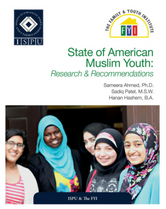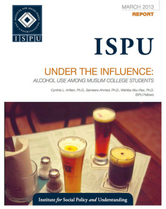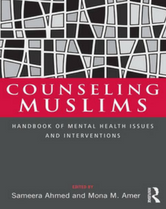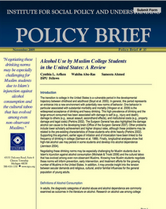
Sameera Ahmed

Expert
Sameera Ahmed, PhD, is the executive director of The Family and Youth Institute, a leading research and education organization dedicated to strengthening and empowering individuals, families, and communities. The FYI is known for producing innovative resources (e.g., infographics, videos, toolkits, research reports) for varying audiences (e.g., researchers, practitioners, policy makers, community organizers, and everyday individuals).
Dr. Ahmed holds a PhD in Clinical Psychology, and her research interests include risk behaviors and protective factors of Muslim adolescents and emerging adults, promoting culturally and religiously meaningful psychotherapy, and skills-based parenting and marital interventions to strengthen families. She is an associate editor for the Journal of Muslim Mental Health. Dr. Ahmed has taught classes at a variety of universities across the nation on topics related to Muslim mental health, adolescent and emerging adults, Islamophobia, and spirituality. She also has a private clinical practice in Canton, Michigan.
Dr. Ahmed is known for her contributions in promoting Muslim mental health through the publication of Counseling Muslims: Handbook of Mental Health Issues and Interventions, the most cited, internationally known academic book on Muslim mental health. Dr. Ahmed is a leading expert on American Muslim youth and has produced numerous groundbreaking publications, including The State of American Muslim Youth, Uplifting Black Muslim Youth, Prevalence of Risk Behaviors of US Muslim College Students, and Alcohol Use Among US Muslim College Students. She has been invited as a subject matter expert to events organized by the White House, Health and Human Services (HHS), Substance Abuse Mental Health Service Administration (SAMHSA), and the Department of Education (DOE). Dr. Ahmed has been cited in national media outlets, including The New York Times, The Washington Post, The Atlantic, and The Huffington Post.
She is best known for her ability to transform research into practical resources tailored to the American Muslim community. Dr. Ahmed has been actively involved in the Muslim community at both the grassroots and national levels for over 30 years, including serving as vice president for the Muslim Students Association of the US and Canada and as a board member of the Muslim American Society (MAS).
Education
BA, University of Michigan; MS, Bowling Green State University; PhD, Farleigh Dickinson University
Areas of Expertise
- Mental health
- Cultural competency
- Muslim adolescents and emerging adults
- Bullying
- American Muslims
- Marriage and family
- Islamophobia
- Qualitative methods
Publications
State of American Muslim Youth: Research & Recommendations
American Muslim youth are a heterogeneous group, w
11 February, 2015Under the Influence: Alcohol Use among Muslim College Students
This pilot study initiates the process of document
27 March, 2013Counseling Muslims: Handbook of Mental Health Issues and Interventions
The issues and interventions discussed in this boo
06 September, 2011Alcohol Use by Muslim College Students in the United States: A Review
The transition to college in the United States is
03 November, 2010
Peer-Reviewed Articles
H. Din, S. Ahmed, and A. Killawi, “Pathways to Wellness: Exploring Muslim Mental Health Promotion in the Digital Age,” Journal of Religion & Spirituality in Social Work: Social Thought 36, no. 1–2 (2017): 96–116.
S. Ahmed and H. Hashem, “A Decade of Muslim Youth: Global Trends in Research,” Journal of Muslim Mental Health 10, no. 1 (2016).
C. Arfken and S. Ahmed, “Ten Years of Substance Use Research in Muslim Populations: Where Do We Go from Here?” Journal of Muslim Mental Health 10, no. 1 (2016).
C. Arfken, W. Abu-Ras, and S. Ahmed, “Pilot Study of Waterpipe Tobacco Smoking among US Muslim College Students,” Journal of Religion and Health 53, no. 4 (2014).
S. Ahmed, W. Abu-Ras, and C. Arfken, “Prevalence of Risk Behaviors among U.S. Muslim College Students,” Journal of Muslim Mental Health 8, no. 1 (2014).
C. Arfken, S. Ahmed, and W. Abu-Ras, “Respondent-Driven Sampling of Muslim Undergraduate U.S. College Students and Alcohol Use: Pilot Study,” Social Psychiatry and Psychiatric Epidemiology 48, no. 6 (2013): 945–53.
W. Abu-Ras, S. Ahmed, and C. Arfken, “Alcohol Use among U.S. Muslim College Students: Risk and Protective Factors,” Journal of Ethnicity in Substance Abuse 9, no. 3 (2010): 206–220.
S. Ahmed and M. Ezzeddine, “Challenges and Opportunities Facing American Muslim Youth,” Journal of Muslim Mental Health 4, no. 2 (2009): 159–74.
S. Ahmed, “American Muslim Youth: Religiosity and Presence of Character Strengths,” Journal of Muslim Mental Health 4, no. 2 (2009): 104–123.
S. Ahmed and L. Reddy, “Understanding the Mental Health Needs of American Muslims: Recommendations and Considerations for Practice,” Journal of Multicultural Counseling and Development 35, no. 4 (2007): 207–219.
Book
S. Ahmed, H. Hashem, and M. Khalid, Uplifting Black Muslim Youth: A Positive Youth Development Approach (The Family & Youth Institute, 2019).
Book Chapters
S. Ahmed and H. Muhammad, “Black Muslim Youth: Navigating Their Environment, while Brokering New Pathways,” in Political Muslims: Understanding Youth Resistance in the Global Context, edited by T. Abbas and S. Hamid (Syracuse, NY: Syracuse University Press, 2019), 23–51.
M. Tahseen, S. R. Ahmed, and S. Ahmed, “Muslim Youth in the Face of Islamophobia: Risk and Resilience,” in Islamophobia and Psychiatry (Cham, Switzerland: Springer, 2019), 307–319.
F. El-Jamil and S. Ahmed, “Cultural Applications of Psychodynamic, Cognitive Behavior, Family Systems, and Culture-Specific Approaches,” in Handbook of Arab American Psychology, edited by M. Amer and G. Awad (New York: Routledge, 2015) 303.
M. M. Abo-Zena and S. Ahmed, “Religion, Spirituality, and Emerging Adults: Processing Meaning Through Culture, Context, and Social Position,” in Emerging Adults’ Religiousness and Spirituality, edited by C. McNamara-Barry and M. M. Abo-Zena (New York: Oxford University Press, 2014).
D. Walker, S. Ahmed, A. Milevsky, H. Quagliana, and A. Bagsara, “Sacred Text,” in Spiritually Oriented Interventions in Child and Adolescent Psychotherapy, edited by D. F. Walker and W. L. Hathaway (Washington, DC: American Psychological Association, 2012).
D. Walker, W. Doverspike, S. Ahmed, A. Milevsky, and J. Woolley, “Prayer,” in Spiritually Oriented Interventions in Child and Adolescent Psychotherapy, edited by D. F. Walker and W. L. Hathaway (Washington, DC: American Psychological Association, 2012).
Report
M. Tahseen, S. Ahmed, and S. R. Ahmed, Bullying of Muslim Youth: A Review of Research and Recommendations (The Family & Youth Institute, 2019).





